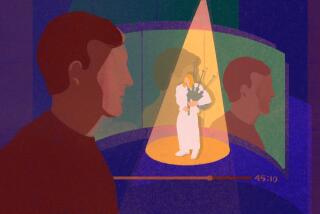A Missed Chance to Explain Tourette’s
- Share via
Several weeks ago, I tuned in to “Ally McBeal” with a great deal of hesitation and uneasiness. The show was about to introduce Melanie, a character with Tourette syndrome, played by Anne Heche.
Although uncontrolled vocal outbursts are a rare symptom of Tourette syndrome, many people still envision it as a condition that allows people to, with perfect comic precision, scream swear words in inappropriate situations. I’ve heard the jokes before and feared that “Ally McBeal” would exploit that line of thinking to its fullest extent.
In some ways, Melanie surprised me. Because tics are a more common symptom of Tourette than uncontrolled vocal outbursts, seeing Melanie display them made me think that maybe the writers had done their homework.
Something about her bothered me, though, and it took me a few episodes to realize what it was. The tics Melanie displays are almost cute, timed for comic effect, more a droll affectation than the byproduct of a neurological disorder too few people know about and understand.
I’ve seen people with Tourette syndrome experience tics. The movements are jerky and sudden, wrenching muscle and bone in an unpredictable and often violent manner. I’ve seen people with Tourette syndrome deal with the aftermath of those spasms. There is pain. There are trips to chiropractors’ offices to undo the damage. There is a lingering bewilderment, for those who have Tourette syndrome, about what is happening to their bodies.
And in contrasting real-life people with Tourette syndrome with Melanie, it became clear to me: For all its attempts at authenticity, the woman Heche plays is ultimately a humorous character and therefore can’t be made too real. If we had to watch Melanie go through the jarring unpredictability of Tourette syndrome symptoms as they occur in real life, we wouldn’t be able to laugh at her. It would be too uncomfortable to watch, too unsettling to enjoy as a joke.
I’m particularly sensitive to this issue because my son Kevin, now an adult, was found to have Tourette syndrome early in childhood. According to the Tourette Syndrome Assn.’s Web site, as many as 1 in 200 might be affected with at least a mild version of it. It is a neurological disorder, similar in ways to Parkinson’s disease, with no known cure. Though some drugs can be used to treat the disorder, they don’t cure it or even mask all its symptoms.
I’m not saying that the media can’t get it right when it comes to portraying people with Tourette syndrome. There are plenty of ways to get it wrong; look no further than 1999’s “Deuce Bigalow: Male Gigolo” for a primer on what not to do. But recent films such as “Niagara, Niagara” and “The Tic Code” took the care necessary to portray people with Tourette syndrome in a realistic manner. Though the movies’ audiences were admittedly limited, those who saw the films received an education on Tourette syndrome that more Americans can use.
Because of a rare symptom associated with Tourette syndrome, and because many people haven’t seen the disorder firsthand, it’s acquired a reputation that has made it fair game for humor. It would be unthinkable to mock celebrities with Parkinson’s disease--imagine the outrage if someone poked fun at Katharine Hepburn or Muhammad Ali or Michael J. Fox. Yet Anne Heche, on the television sets of America, is reinforcing a misunderstanding about a puzzling and incurable neurological disorder in the same neighborhood as Parkinson’s. By making Melanie the focus of a few jokes, she has become yet another missed opportunity to educate Americans that Tourette syndrome isn’t nearly as funny as they think it is.


